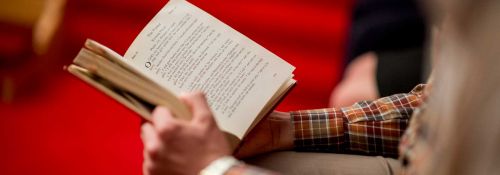
Athens and Jerusalem: My Faith at Hillsdale College
Written by Anne Hotz
I was raised in a traditional Christian home, and my faith was a major part of my life. In high school I studied formal apologetics, and I knew that I wanted studying the Bible to have a key role in my life. This desire became extremely influential when I started the college search process.
Some mentors advised me to take my faith to large, predominantly liberal campuses where I could actively spread the gospel to peers from a wide variety of backgrounds. I could be a strong influence in a place largely hostile to my beliefs, but I feared that I would be isolated and prevented from being able to cultivate deep, faith-based relationships.
At the other end of the spectrum, others suggested that I attend a Christian school that required signing a statement of faith and attending chapel regularly. At this type of school, my faith would put me in the majority of the student body, and I imagined feeling much more secure in my friendships and relationships with professors. Yet I worried that this environment might be too stifling. Would there be a healthy amount of disagreement and respectful debate? Would I be able to make my own impression, or would it be forced upon me?
Not satisfied with either extreme, I looked for schools that had a middle ground of sorts, and I found Hillsdale College.
The first thing that impressed me about Hillsdale was the honor code, a brief statement that holds students accountable on the basis of honor, respect, duty, and self-government. These lofty ideals play into everyday life for Hillsdale students. We leave our backpacks in open cubbies when we go into the cafeteria, and we leave phones and wallets on tables to reserve them while we get food. This implicit level of trust in our peers is reflected in conversations, where students start on a rational basis and move toward a religious conclusion, rather than vice versa.
I vividly remember a Western Heritage class during my first semester of freshman year, when my professor discussed Tertullian’s famous provocation: “What indeed has Athens to do with Jerusalem?” In other words, Tertullian believed that religious matters should be entirely separated from scholastic pursuits. After my professor had challenged this belief, I began to see manifestations of his position permeating everyday life.
Professors assign excerpts of the Bible in history, philosophy, and literature classes as well as religion courses, and students are expected to treat the Bible with at least the same level of seriousness with which we treat Plato and Aristotle.
Hillsdale is predicated on the notion that Christianity is true, but this never means that one has an excuse to mistreat another’s beliefs. The campus is full of opportunities to spread the Christian faith, and one can easily find friends with whom to grow. Hillsdale cultivates a deeply respectful environment in which anyone can make an impression if he or she is willing to engage. I couldn’t be happier with my choice to learn and mature in a place where my faith is respected and held to a high standard.
 Anne Hotz, ’18, is an English major and classical education minor from Lincoln, Nebraska. She is passionate about C.S. Lewis, musicals, British novels, sweaters, and hedgehogs.
Anne Hotz, ’18, is an English major and classical education minor from Lincoln, Nebraska. She is passionate about C.S. Lewis, musicals, British novels, sweaters, and hedgehogs.